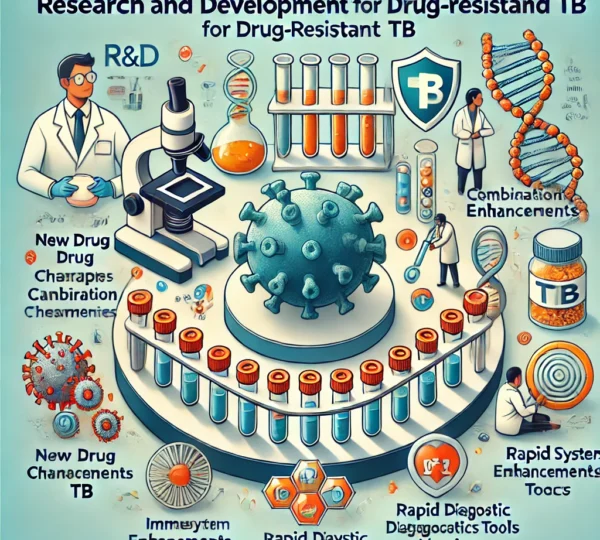Research and Development in Drug-Resistant TB: Promising Advances and Future Directions
Introduction: Research and development (R&D) play a crucial role in the fight against drug-resistant tuberculosis (TB). As the global health community grapples with increasing rates of drug resistance, innovative solutions are more important than ever. In this blog, we will explore some promising advances in R&D for drug-resistant TB. Additionally, we will discuss future directions in the quest for better treatments and improved outcomes.
1. Novel Drug Candidates
Researchers are continually exploring new drug candidates that specifically target drug-resistant TB bacteria. These novel compounds show great promise, offering the potential for improved efficacy and reduced side effects compared to current medications. For instance, some of these new agents are designed to work effectively against strains of TB that have developed resistance to traditional therapies. This innovation could shorten treatment durations, making it easier for patients to adhere to their regimens and complete their therapies successfully.
2. Drug Combination Therapies
Combining multiple drugs with different mechanisms of action is a promising approach to combatting drug-resistant TB. By using a cocktail of medications, healthcare providers can enhance treatment effectiveness while preventing the development of further resistance. For example, researchers have found that certain drug combinations can work synergistically, leading to improved patient outcomes. Therefore, this approach not only increases the chances of successful treatment but also minimizes the risk of relapse.
3. Host-Directed Therapies
Host-directed therapies represent an innovative strategy that focuses on modulating the body’s immune response to TB infection. Unlike traditional treatments that target the bacteria directly, these therapies aim to enhance the body’s natural defenses against the disease. By targeting the host rather than the pathogen, these treatments could improve outcomes, particularly in cases of drug-resistant TB. Additionally, host-directed therapies have the potential to reduce the severity of side effects associated with conventional TB treatments, further benefiting patients.
4. Rapid Diagnostic Tests
Developing rapid diagnostic tests for drug-resistant TB is essential for early detection and prompt initiation of appropriate treatment. Researchers are actively working on innovative diagnostic tools that can quickly identify drug-resistant strains of TB. By facilitating early diagnosis, these tests enable healthcare providers to implement more targeted treatment strategies, significantly improving patient outcomes. Furthermore, rapid diagnostics can help curb the spread of drug-resistant TB by ensuring that patients receive the most effective treatments as soon as possible.
5. Vaccine Development
While there is currently no widely available vaccine for TB, researchers are actively pursuing the development of new TB vaccines, including those that specifically target drug-resistant strains. A safe and effective vaccine could play a significant role in preventing the spread of drug-resistant TB in the future. Moreover, widespread vaccination could decrease the overall incidence of TB, thereby reducing the pool of individuals who may develop drug-resistant forms of the disease.
Conclusion: In conclusion, research and development efforts in drug-resistant TB are yielding promising advances that offer hope for better treatments and outcomes. By continuing to invest in R&D and supporting collaborative efforts among researchers, healthcare providers, and policymakers, we can work towards a future where drug-resistant TB is no longer a global health threat. Together, we can pave the way for innovative solutions that will protect public health and improve the lives of those affected by this challenging disease.
To seek medical advice, always consult a Doctor. Here are our recommended experts. Click here
To read more on Respiratory disease . Click Here




